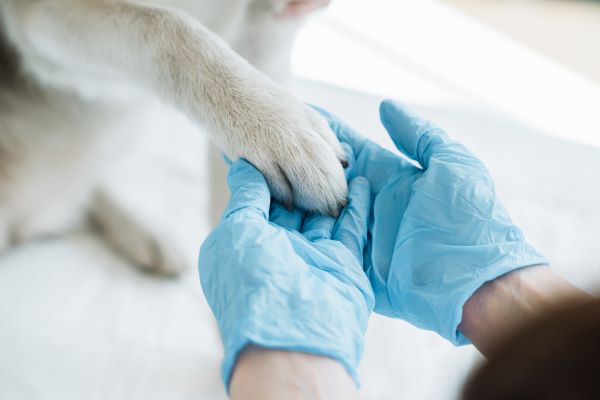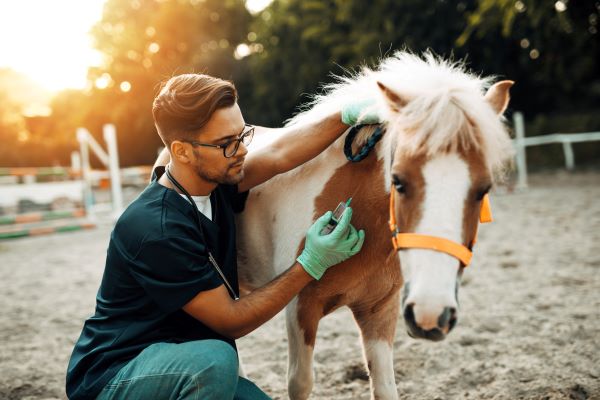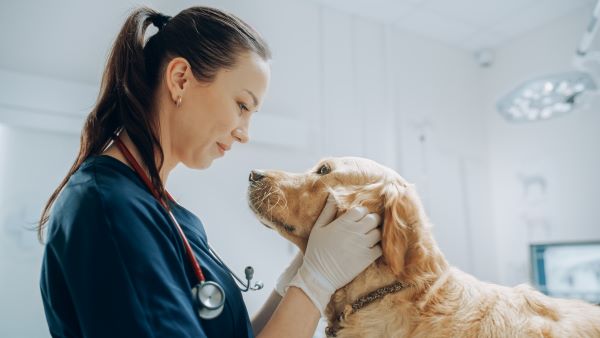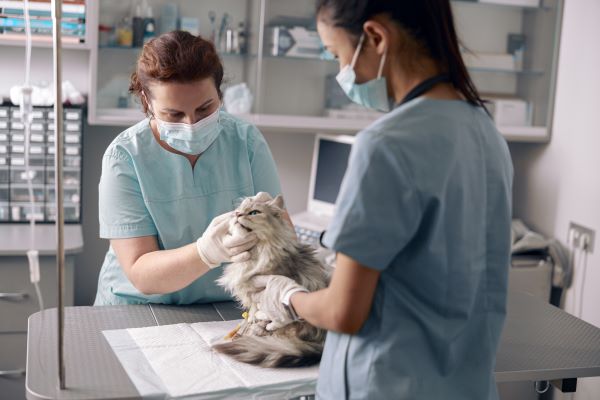With a love for animals, an aptitude for science and a preference for hands-on work, you would make a great veterinarian. This career is personally and financially rewarding, but to get into it, you’re going to need a lot of schooling. That’s why so many prospective students are asking how to become a veterinarian.
What do you major in to become a vet? The education required for veterinarians includes a bachelor’s degree, but it takes more than an undergraduate education to become a vet. You’re going to need a doctoral degree like a Doctor of Veterinary Medicine to be qualified to work as a veterinarian.

What Does a Veterinarian Do?
Veterinarians are healthcare practitioners who are concerned with animal health and wellness. Veterinarians, or vets, provide both sick and well animal care. They work in clinical practice and perform duties such as:
- Conduct physical examinations of animal patients
- Consult pet owners and animal caretakers on patients’ symptoms
- Diagnose and treat animal diseases
- Treat injuries
- Conduct tests, including blood tests and X-rays
- Perform medical procedures, including surgeries, on animals
- Prescribe medication to prevent or treat medical issues
- Educate pet owners and animal caretakers on proper care, training and wellness recommendations
Vets commonly work in environments such as:
- Animal hospitals
- Veterinary clinics
- Animal shelters
- Private practice offices
When you first think of a veterinarian, you probably think of the animal doctor who treats cats and dogs. This type of vet is known as a companion animal veterinarian. In addition to cats and dogs, companion animal vets also treat other types of pets. For example, they may treat small animals like rabbits and guinea pigs, as well as reptiles, birds, tarantulas and other exotic pets. Today, some companion animal veterinarians offer mobile medical services and travel to pet owners’ homes to examine and treat animal patients.
Not all vets cater to companion animals. Some vets specialize in treating farm animals, zoo animals, and other types of large animals or exotic animals. These veterinarians either work in or travel to locations like farms and zoos.

Most veterinarians – more than 80% – worked in the veterinary services industry in 2022, according to the United States Bureau of Labor Statistics (BLS). Another 10% of veterinarians are self-employed. For the most part, self-employed vets open their own private practices, out of which they offer veterinary services.
RELATED: 15 Degrees That Are Perfect for Becoming Your Own Boss
Although veterinarian requirements are extensive, this position pays well. The median annual salary the Bureau of Labor Statistics reported for veterinarians in 2022 was $103,260.
How Many Years Does It Take to Become a Veterinarian?
Like medical doctors who treat human patients, veterinarians are in for a great deal of career preparation. On the heels of asking how to become a veterinarian, aspiring vets often ask another question: How long does it take to become a veterinarian?
The minimum amount of time it takes to become a veterinarian is equivalent to how many years of school to be a vet: eight years. Before you can practice veterinary medicine, you must earn a bachelor’s degree and a Doctor of Veterinary Medicine (DVM) degree. Combined, both degrees typically take a minimum of eight years to complete.
RELATED: What Can I Do With a Veterinary Medicine Degree?
Suppose, however, that you want to specialize in your veterinary career or acquire additional professional certifications. How many years to become a veterinarian who is board-certified increases by at least another three to five years. In other words, you may begin work as a practicing veterinarian after eight years of education beyond high school, but you can’t receive Board Certification until at least 11 to 13 years after high school graduation.
What Education Is Required to Be a Veterinarian?
What degree do you need to be a veterinarian? To begin practicing veterinary medicine, you need a doctorate-level veterinary medical education. Generally, this means the Doctor of Veterinary Medicine (DVM) degree.
Getting Into Veterinary Medical Colleges
Applying to vet schools is a challenging process. There are relatively few veterinary colleges in the U.S. The American Veterinary Medical Association (AVMA) Council on Education accredits only 32 schools in 27 states as of 2023. Despite efforts of veterinary schools to increase spots for qualified applicants, only around 3,200 students graduate from veterinary school each year in the United States.
Rumors that veterinary school is harder to get into than medical school are false, according to the American Association of Veterinary Medical Colleges. However, statistically speaking, veterinary school is as difficult to get into as medical school is. Only about 50% of applicants are accepted into veterinary schools.
What makes someone a competitive veterinary school applicant? At many schools, admissions teams are looking to accept students who have the following:
- A strong GPA (often, above 3.0)
- A competitive score on a standardized test – most commonly, the Graduate Record Exam
- Compelling letters of recommendation
- A powerful personal statement
- Any additional testing your target school requires, such as the Computer-Based Assessment for Sampling Personal Characteristics (CASPer) test
Applicants who already have some experience working or volunteering with animals or alongside a licensed veterinarian have a greater likelihood of getting accepted into veterinary school. Involvement in extracurricular activities like your school’s pre-vet club can also strengthen your application. Any activities that demonstrate your commitment to becoming a veterinarian can be valuable when you’re applying to vet school.

Aspiring vets should start preparing to apply to veterinary school programs early. Generally, applicants should apply to vet school by the fall of their senior year of undergraduate study. That means they should begin researching schools and getting familiar with admission requirements no later than their junior year.
Coursework and Clinical Skill Development in a DVM Program
Veterinary school is a four-year commitment. A prospective vet school student should expect to take courses in the following areas:
- Microbiology
- Pathology
- Physiology
- Immunology
To care for a variety of animal species, veterinary students spend considerable time studying the anatomy and physiology of many different species of animals. Aspiring veterinarians also learn the surgical techniques and other inventions used to treat animals.

Veterinary courses are often fast-paced and intense. Vet school professors will launch right into advanced topics, assuming that you’re already well-versed in the basics from the undergraduate coursework you have taken. That’s why most schools establish prerequisite requirements that encompass mathematics and laboratory science.
Generally, the first three years of veterinary programs encompass lectures and instruction in the classroom, laboratory work and the start of students’ clinical experience. During their fourth and final year of the program, veterinary students learn primarily through clinical rotations in settings like an animal hospital or veterinary medical center. Once they complete veterinary school, they receive their DVM degree and are ready to apply for state licensure.
This doctoral-level education is the most important step to become a veterinarian. The formal veterinarian education requirements focus primarily on the Doctor of Veterinary Medicine degree. The DVM degree must be awarded by a school accredited by the American Veterinary Medical Association (AVMA) Council on Education.
As important as a vet degree for this career path, it’s not the first step an aspiring veterinary student needs to take. Before they can apply for a doctoral degree program in veterinary medicine, students must earn an undergraduate degree.
Licensure After Vet School
Beyond the education requirements for veterinarian careers, there’s one thing you need to become a veterinarian: a license to practice. Vets must be licensed in all U.S. states. Getting licensed to become a veterinarian typically requires earning a passing score on both a national and state licensing exam, the BLS reported.
The national exam is known as the North American Veterinary Licensing Examination. It is a multiple-choice exam that includes 360 questions, although 60 of these questions are unscored. Before students can sit for their licensing exams, they must complete the coursework and clinical rotations required to earn their Doctor of Veterinary Medicine degree from an accredited school. Once they have successfully passed their licensing exams, they can begin practicing.
If you would like to work in veterinary specialties like animal oncology or cardiology, shelter medicine, avian medicine or equine medicine, you need even more training. Veterinarians seeking Board Certification in a specialty typically complete additional years of veterinary internship, residency and clinical training. For most specialties, you can expect to spend three to five years gaining hands-on experience through this additional training before you are eligible to sit for certification exams.
What Undergraduate Major Do You Need to Be a Vet?
Of course, before you can start pursuing a veterinarian degree, you need to complete your undergraduate education. If you know you want to become a veterinarian, your bachelor’s degree coursework should align with this goal. While your undergraduate studies do precede your doctoral coursework in veterinary medicine, you can’t make an informed choice about an undergraduate college major without thinking about the realities of getting into – and doing well in – veterinary school.
The answer to the question “What major do you need to be a veterinarian?” is open-ended. Various undergraduate pathways can lead to a veterinary career. More important than the actual major you choose is whether your undergraduate coursework includes the prerequisite courses most veterinary schools are seeking. Prerequisite courses at most vet schools include:
- Biology
- Microbiology
- Biochemistry
- General chemistry
- Physics
- Mathematics and statistics
What Do Veterinarians Major in as Undergraduates?
Now that you’re familiar with the full process of becoming a vet, you can use this big-picture perspective to weigh your options for a major to pursue as you work toward earning your bachelor’s degree.
How to Choose a Vet Major in College
Students often choose a major based on what they think they “should” study to achieve a certain outcome (like becoming a vet). However, that’s not always the right move. For many careers, including veterinarian, there are multiple undergraduate majors that could lead to this career path.
Here are the factors you should consider when choosing an undergraduate major as a prospective veterinarian:
How Will This Major Prepare You for Veterinary School Admissions Tests?
Most veterinary schools expect applicants to take the Graduate Record Examination (GRE) General Test. Some also ask for scores on relevant GRE Subject Tests. Some schools will even want Medical College Admission Test (MCAT) scores, according to the American Veterinary Medical Association. These different standardized tests assess different skills and areas of knowledge. Students should think about how a possible major will help them perform well on the different types of exams.
How Does the Major Pertain to Veterinary Medicine?
Hard science majors more obviously connect to the field than majors in the social sciences, the arts, the humanities, business and other fields. If you’re opting for a major with less obvious links to veterinary medicine, is there something else in your application that demonstrates your commitment to the field? For example, what does your volunteer experience, work experience or extracurricular activities say about your commitment to becoming a veterinarian?
RELATED: What Are the Best Degrees for Animal Lovers?

Does This Major Cover Vet School Prerequisites?
Can you meet all of the prerequisite coursework that is required for veterinary school while pursuing your intended major? Solid veterinary school preparation involves plenty of classes in science subjects. If you don’t take these courses, you won’t have the foundation that your vet school coursework is meant to build upon. You will have a hard time even being accepted into veterinary school in the first place. These studies don’t necessarily have to be part of your undergraduate major requirements. However, you have to fit these courses into your schedule somehow. You could take these classes as your free electives or as part of a pre-vet, pre-med or pre-health academic track.
Will This Major Help You Be a Better Veterinarian?
Think past the requirements and expectations for school. Consider what non-technical skills, knowledge and qualities are important in a good vet.
A degree that isn’t in line with usual veterinary majors like biology or chemistry may still help you develop important skills such as:
- Problem-solving skills
- Communication skills
- Critical thinking skills
- Decision-making skills
- Capacity for compassion and sensitivity to the animals you will take care of and their owners
All of these attributes are crucial qualities for veterinarians. If you want to run your own veterinary practice, an undergraduate major in business may be valuable for getting your company started and managing the practice.

Choosing a major isn’t like solving a problem with only one right answer. Different degree paths may help you achieve these different outcomes in various ways. Your personal interests and strengths should also play a role in choosing your major. If you don’t really love biology or chemistry, you might opt to take only the minimum courses in these subjects required to satisfy your vet school prerequisites and instead major in something you do have a passion for, even if it’s not especially relevant to vet school.
The Most Popular Majors for Veterinarians
Undergraduates who want to become veterinarians have a range of choices when it comes to majors. In fact, you can major in anything you want. Students have been accepted to veterinary schools with backgrounds in English, visual arts and other non-science fields. You just need a sufficient undergraduate science foundation to understand and excel at the doctoral-level coursework of vet school.
Having said that, science majors are particularly popular among prospective vet school students. Obtaining a strong background in college-level math and science can boost your chances of getting into and succeeding in vet school. Majors in animal sciences and wildlife biology will help you focus on science as it pertains to working with animals. A veterinary technology or pre-veterinary course of study will emphasize the skills and knowledge needed to work in a veterinary practice. Considering how many vet school prerequisites involve branches of science like biology and chemistry, many students feel that it makes sense to choose either bio or chchemem as their major. You might also opt to double major in those subjects or study related fields like biochemistry, microbiology and zoology.

Animal Sciences
Students who major in animal sciences should expect to start with introductory courses in animal science, biology and animal management. The curriculum will also include basic science courses in chemistry, molecular and cellular biology, biochemistry, microbiology and genetics. Animal science degree programs may offer different concentrations and specializations, such as animal management, equine science or biotechnology.
Wildlife Biology
Somewhat more specialized than a regular biology major is wildlife biology. This major emphasizes the study of animal and plant biology, as opposed to the biology of bacteria and other unicellular microorganisms. Coursework in a wildlife biology bachelor’s degree program will include:
- Functional biology
- Organismal biology
- Genetics
- Zoology
- Botany
- Ecology
- Evolution
- Biometry
- Wildlife management
Veterinary Technology or Pre-Veterinary Science
Generally, the goal of a veterinary technology program is to prepare you to work as a veterinary technologist, not to equip you with a background for practicing veterinary medicine. However, as long as you’re studying the science courses required for vet school, too, a major in veterinary technology can be useful because it provides technical training in the hands-on work done in veterinary practice environments. Veterinary technology majors take courses in clinical nursing for large and small animals, veterinary clinical lab techniques, veterinary pathology and parasitology, veterinary pharmacology, veterinary diagnostic imaging and small animal anesthesia and surgery. Science coursework includes laboratory classes in anatomy and physiology, biology, microbiology and general chemistry.
Pre-veterinary science isn’t always a distinct major. Often, it’s an academic track or program you can pursue from various majors or a major or concentration that exists within animal science programs. The curriculum of a pre-veterinary science major will likely include sequences of basic science courses in biology, cellular and molecular biology, microbiology, biochemistry, general chemistry, organic chemistry, and genetics. Animal-specific courses may include basic animal nutrition and feeding, animal science, animal management, animal welfare, animal anatomy and physiology, the physiology of animal reproduction and infection and immunity in animals.
General Biology and Biological Sciences
In a general biology degree program, undergraduate students will usually take classes in:
- Introductory biology
- Microbial science
- Genetics
- Biochemistry
- Physics
- General and organic chemistry
If your program offers different concentration options, an animal biology specialization will probably be the most relevant area for aspiring vets. These classes often include a sequence of coursework in anatomy and physiology as well as studies in comparative animal physiology and animal diversity and morphology.
Chemistry
For a bachelor’s degree in chemistry, you will typically complete a series of courses in:
- General chemistry
- Organic chemistry
- Inorganic chemistry
- Physical chemistry
- Biochemistry
- Analytical chemistry
- Computational chemistry
Undergraduate research experiences in chemistry, as well as instrumental analysis courses, can help you build your technical and hands-on skills in the field.
Biochemistry
Majoring in biochemistry combines considerable coursework in biology and chemistry, along with studies in math, physics and other relevant areas. Expect to study general chemistry and biology as well as subjects like:
- Organic chemistry
- Inorganic chemistry
- Physical chemistry
- Analytical chemistry
- Biostatistics
- Cellular biology
- Genetics
- Laboratory biochemistry
- Metabolic biochemistry
- Molecular structure in biochemistry
- Nucleic acid biochemistry
Microbiology
Microbiology is the area of biology that focuses on studying microorganisms, or organisms that are too small to be seen with the naked eye. A microbiology major will take both basic and specialized science courses. Studies in a microbiology degree program may include:
- Introductory microbiology
- Biochemistry
- Molecular biology
- Genetics
- Prokaryotic biology
- Microbial ecology
- Virology
- Experimental microbiology
- Environmental microbiology
- Immunology
- Experimental genetics and genome editing
Zoology
As an animal-focused branch of biology, the field of zoology encompasses basic science studies and coursework pertaining to animal studies particularly, such as:
- Animal behavior
- Invertebrate and vertebrate biology
- Marine biology and ecology
- Aquatic entomology
- Conservation of marine mammals
- Herpetology, the study of reptiles and amphibians
Once you’re in veterinary school, your undergraduate science training will prove to be a major asset – but it’s essential that you intentionally seek out ways to apply this training. Your undergraduate major should cover a wide range of research methods and prepare you for hands-on fieldwork as well as taking notes in class. You don’t just want to learn a lot of facts as an undergrad. You also want to learn how to think, how to study and how to put that knowledge into practice in the real world.
If you already have a bachelor’s degree but you’re afraid that you don’t have quite enough training in the sciences, that doesn’t mean you have to give up on your career dreams. Taking additional courses, either as a non-degree student or in the pursuit of a master’s degree, can fill in the gaps in your education.
Additional Resources
What Degree Do I Need to Become an Ethologist?
Highest Paying Jobs With a Biology Degree – Degrees in Biology – Majors & Careers

